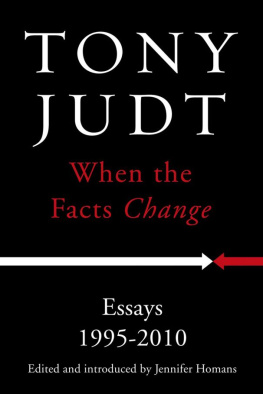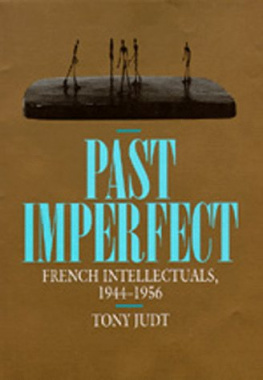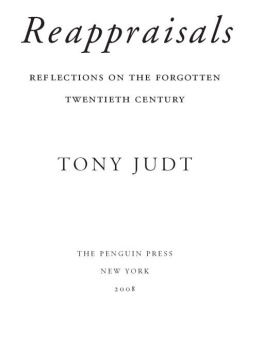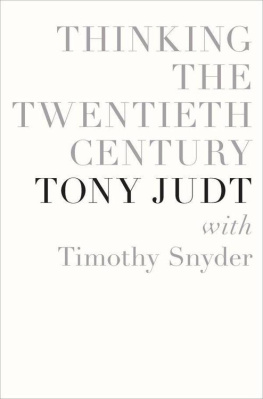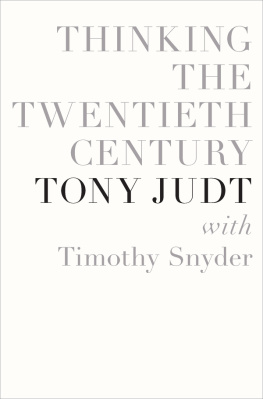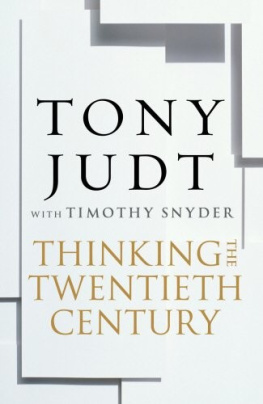Tony Judt - The Burden of Responsibility: Blum, Camus, Aron, and the French Twentieth Century
Here you can read online Tony Judt - The Burden of Responsibility: Blum, Camus, Aron, and the French Twentieth Century full text of the book (entire story) in english for free. Download pdf and epub, get meaning, cover and reviews about this ebook. genre: Politics. Description of the work, (preface) as well as reviews are available. Best literature library LitArk.com created for fans of good reading and offers a wide selection of genres:
Romance novel
Science fiction
Adventure
Detective
Science
History
Home and family
Prose
Art
Politics
Computer
Non-fiction
Religion
Business
Children
Humor
Choose a favorite category and find really read worthwhile books. Enjoy immersion in the world of imagination, feel the emotions of the characters or learn something new for yourself, make an fascinating discovery.

The Burden of Responsibility: Blum, Camus, Aron, and the French Twentieth Century: summary, description and annotation
We offer to read an annotation, description, summary or preface (depends on what the author of the book "The Burden of Responsibility: Blum, Camus, Aron, and the French Twentieth Century" wrote himself). If you haven't found the necessary information about the book — write in the comments, we will try to find it.
The Burden of Responsibility: Blum, Camus, Aron, and the French Twentieth Century — read online for free the complete book (whole text) full work
Below is the text of the book, divided by pages. System saving the place of the last page read, allows you to conveniently read the book "The Burden of Responsibility: Blum, Camus, Aron, and the French Twentieth Century" online for free, without having to search again every time where you left off. Put a bookmark, and you can go to the page where you finished reading at any time.
Font size:
Interval:
Bookmark:


The Burden of Responsibility
BLUM CAMUS ARON AND THE FRENCH TWENTIETH CENTURY
Tony Judt
THE UNIVERSITY OF CHICAGO PRESS
CHICAGO AND LONDON
The University of Chicago Press, Chicago 60637
The University of Chicago Press, Ltd., London
1998 by The University of Chicago
All rights reserved. Published 1998
Paperback edition 2007
17 16 15 14 13 12 11 3 4 5 6 7
ISBN-13: 978-0-226-41418-8 (cloth)
ISBN-13: 978-0-226-41419-5 (paper)
ISBN-13: 978-0-226-41420-1 (ebook)
ISBN-10: 0-226-41418-3 (cloth)
ISBN-10: 0-226-414191 (paper)
Library of Congress Cataloging-in-Publication Data
Judt, Tony.
The burden of responsibility : Blum, Camus, Aron, and the French twentieth century / Tony Judt.
p. cm.
Includes bibliographical references and indexes.
ISBN 0-226-41418-3 (alk. paper)
1. FranceIntellectual life20th centuryPolitical aspects. 2. Blum, Lon, 18721950Contributions in ethics. 3. Camus, Albert, 19131960Contributions in ethics. 4. Aron, Raymond, 19051983Contributions in ethics. 5. IntellectualsFrancePolitical activityHistory20th century. I. Title.
DC33.7.J83 1998
944.08'092'2dc21
98-22269
CIP
 The paper used in this publication meets the minimum requirements of the American National Standard for Information SciencesPermanence of Paper for Printed Library Materials, ANSI Z39.48-1992.
The paper used in this publication meets the minimum requirements of the American National Standard for Information SciencesPermanence of Paper for Printed Library Materials, ANSI Z39.48-1992.
CONTENTS
ONE: The Prophet Spurned
LON BLUM AND THE PRICE OF COMPROMISE
TWO: The Reluctant Moralist
ALBERT CAMUS AND THE DISCOMFORTS OF AMBIVALENCE
THREE: The Peripheral Insider
RAYMOND ARON AND THE WAGES OF REASON
PREFACE
These essays were originally conceived for the Bradley Lectures at the University of Chicago, and I am grateful to the Bradley Foundation and to Professor Robert Pippin, chair of the Committee on Social Thought at the University of Chicago, for the opportunity they afforded me to develop some of my thoughts on France and French intellectuals.
New York University generously gave me leave to work on this and other projects, and some of that leave was spent in 1995 as the guest of the Institut fr die Wissenschaften vom Menschen (IWM) in Vienna, where my stay was supported in part by a grant from the Volkswagen Foundation. I am grateful to these institutions for their support, and to the director of the IWM, Professor Kryzstof Michalski, for his unfailing hospitality. My editor at the University of Chicago Press, T. David Brent, has been tolerant and supportive despite having had to wait rather longer for this book than originally anticipated.
Versions of the essays on Albert Camus and Raymond Aron were presented at Northwestern University, Michigan State University, McGill University, and the University of Vienna, as well as at the University of Chicago itself, in public lectures and in seminars. Audiences and participants at these events, and my own students at the Institute of French Studies at New York University, offered many criticisms and suggestions, and this is a better book for their contribution. Its idiosyncracies and errors are of course my own.
In quoting from the work of my three subjects I have taken the liberty of translating them anew in almost every case, rather than using existing English-language versions. Where this is not the case, I have indicated as much in the notes. Full reference to the original source, and some suggestions for further reading, can be found in the notes and in a short bibliographical note, Further Reading, at the end.
This book is dedicated to the memory of Franois Furet. It was at his invitation that I initially agreed to prepare these lectures, and with his enthusiastic encouragement that I devoted them to Blum, Camus, and Aron. Furet was an admirer of all three men, though his links, intellectual and personal, were of course closest to Raymond Aron. He directed the institute in Paris named after Aron, and when he died he was at work on a study of Alexis de Tocqueville, perhaps Arons favorite French thinker. But Furet was in some measure the natural heir of Blum and Camus no less than Aron. His scholarly work on the history of the French Revolution, rejecting first the Marxist interpretation and then the newly conventional cultural history, assured him academic opposition on both sides of the Atlantic. His courageous condemnation of the political cant of his age, whether anti-anti-Communist or multicultural, made him political enemies in France and abroad. And his growing influence upon public understanding of the French past aroused his opponents to paroxysms of resentment, notably on the occasion of the bicentenary of the Revolution, when attacks on Furet and his school took on a markedly personal and ad hominem character.
All this would have been very familiar to the men to whom these essays are devoted. Like them, Franois Furet was a public intellectual whose qualities as an insider did not prevent him being treated at various times and in various circles as an outsider and even a renegade. Like them, he went against the grain, in Furets case twice over: first by undermining and recasting the history of the Revolution, Frances national foundation myth, and then by publishing, late in life, an enormously influential essay on Communism, the myth (or illusion, in Furets words) of the twentieth century. Like them, he was at times better appreciated abroad than at home. And like them, his influence and ideas have triumphed over his critics and will surely outlast them. It has been widely observed that there was not and is not a Furet school of French history. But then there is no Aron school of French social thought, no Camus school of French moralists, no Blum school of French social democracy. These men did not stand for some contending version of French intellectual or political engagement; they stood, in the end, only for themselves and what they believed. And that is why, in time, they have come to stand for much of what is best in France.
The Burden of Responsibility

Le romantisme franais, dit Goethe, est n de la Rvolution et de l'Empire: Gloire et Libert! Du mouvement Socialiste nous verrons natre un nouveau lyrisme: Justice et Bonheur!
LON BLUM

S'il existait un parti de ceux gui ne sont pas srs d'avoir raison, j'en serais.
ALBERT CAMUS
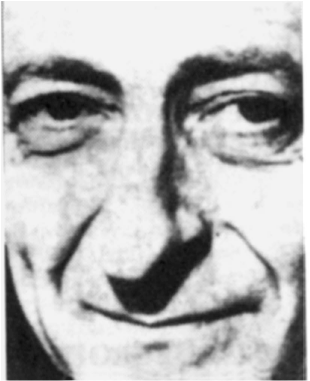
Con'est jamais la lutte entre le bien et le mal, c'est de prfrabde contre le dtestable.
RAYMOND ARON
INTRODUCTION
The Misjudgment of Pairs
History is not written as it was experienced, nor should it be. The inhabitants of the past know better than we do what it was like to live there, but they were not well placed, most of them, to understand what was happening to them and why. Whatever imperfect explanation that we can offer for what took place before our time depends upon the advantages of hindsight, even though that same hindsight is itself an insuperable impediment to complete empathy with the history we are trying to understand. The shape of past events depends upon a perspective taken in place and in time; all such shapes are partial truths, though some acquire a more lasting credibility.
Font size:
Interval:
Bookmark:
Similar books «The Burden of Responsibility: Blum, Camus, Aron, and the French Twentieth Century»
Look at similar books to The Burden of Responsibility: Blum, Camus, Aron, and the French Twentieth Century. We have selected literature similar in name and meaning in the hope of providing readers with more options to find new, interesting, not yet read works.
Discussion, reviews of the book The Burden of Responsibility: Blum, Camus, Aron, and the French Twentieth Century and just readers' own opinions. Leave your comments, write what you think about the work, its meaning or the main characters. Specify what exactly you liked and what you didn't like, and why you think so.

